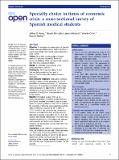Specialty choice in times of economic crisis: a cross-sectional survey of Spanish medical students
Author(s)
Harris, Jeffrey E.; Gonzalez Lopez-Valcarcel, Beatriz; Ortun, Vicente; Barber, Patricia
DownloadHarris_Specialty choice.pdf (860.5Kb)
PUBLISHER_CC
Publisher with Creative Commons License
Creative Commons Attribution
Terms of use
Metadata
Show full item recordAbstract
Objective: To investigate the determinants of specialty choice among graduating medical students in Spain, a country that entered into a severe, ongoing economic crisis in 2008.
Setting: Since 2008, the percentage of Spanish medical school graduates electing Family and Community Medicine (FCM) has experienced a reversal after more than a decade of decline.
Design: A nationwide cross-sectional survey conducted online in April 2011.
Participants: We invited all students in their final year before graduation from each of Spain's 27 public and private medical schools to participate.
Main outcome measures: Respondents’ preferred specialty in relation to their perceptions of: (1) the probability of obtaining employment; (2) lifestyle and work hours; (3) recognition by patients; (4) prestige among colleagues; (5) opportunity for professional development; (6) annual remuneration and (7) the proportion of the physician's compensation from private practice.
Results: 978 medical students (25% of the nationwide population of students in their final year) participated. Perceived job availability had the largest impact on specialty preference. Each 10% increment in the probability of obtaining employment increased the odds of preferring a specialty by 33.7% (95% CI 27.2% to 40.5%). Job availability was four times as important as compensation from private practice in determining specialty choice (95% CI 1.7 to 6.8). We observed considerable heterogeneity in the influence of lifestyle and work hours, with students who preferred such specialties as Cardiovascular Surgery and Obstetrics and Gynaecology valuing longer rather than shorter workdays.
Conclusions: In the midst of an ongoing economic crisis, job availability has assumed critical importance as a determinant of specialty preference among Spanish medical students. In view of the shortage of practitioners of FCM, public policies that take advantage of the enhanced perceived job availability of FCM may help steer medical school graduates into this specialty.
Date issued
2013-02Department
Massachusetts Institute of Technology. Department of EconomicsJournal
BMJ Open
Publisher
BMJ Publishing Group Ltd.
Citation
Harris, J. E., B. Gonzalez Lopez-Valcarcel, V. Ortun, and P. Barber. “Specialty choice in times of economic crisis: a cross-sectional survey of Spanish medical students.” BMJ Open 3, no. 2 (January 31, 2013): e002051-e002051.
Version: Final published version
ISSN
2044-6055